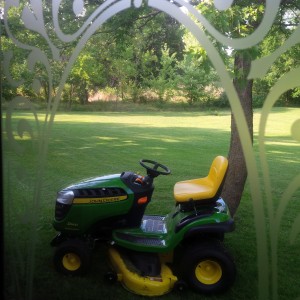Following is a portion of a poem I penned approximately eight years ago:
My wife and kids, they think I'm weird
I find it such a treat
I'm so content, enthralled, endeared
Upon that cushioned seat
We all must have a place of peace
A sanctumesque retreat
A place to go-let go-release
Replete-discreet-complete
Upon my mower I hold dear
The power and the noise
Snug seat, cup holder for my beer
Penultimate man toys
Drowns out all sound; my mind roams free
My troubles disappear
I sing, I cuss, I shout with glee
Because no one can hear
It's like a thousand waterfalls
Struck dumb with wondrous awe
The Man Gods have decreed to all
Horsepower is Man Law
This summer I have rediscovered these joys.
This week I have read some arguments that maintain knowledge is NOT the exclusive realm of the brain. These arguments challenge the common assumption that motor skills, (such as playing tennis), do not require knowledge because knowledge requires verbalization, and it is difficult (to impossible), to provide a detailed, verbal accounting of, (or even be aware of), the knowledge utilized before, during, or after demonstrating the skill. Sure, the tennis player has knowledge of the game and proper technique, but I am confident that the tennis player does not consciously think, "I will put this foot here, and that foot there, and pull my arm back to 18 degrees behind and 7 degrees below my shoulder, and..." One is hard pressed to account for knowledge in the arm or legs. Yet, how many people do we know who talk with their hands? And who is to say with certainty that this is not knowledge? The argument could certainly be made that these arm gestures appear to help some individuals with reasoning and thinking. One argument I read likens this bias toward the brain as the sole seat of knowledge, with the drunk looking for his keys under the streetlamp because "that's where the light is;" (though he freely admits that his keys could be anywhere on the street). The brain is where the light is.
(*I should note that all of these paraphrased arguments have come from "The Stone Reader: Modern Philosophy in 133 Arguments" edited by Peter Catapano and Simon Critchley.)
This interesting argument against convention, extends to nonbiological body parts such as cochlear implants that obviously aid in knowledge. And from there, though I believe we may agree that the brain is the throne of knowledge, one essayist argues that the smart-phone, (and other similar technological innovations), might also qualify as a lesser seat of knowledge.
And this brings me back to my bright yellow mower seat. Yes! I am going to argue that this is an aid in acquiring knowledge, and it therefore, (with a small leap), also qualifies as a seat of knowledge. Knowledge need not reside in the brain. Knowledge can live in muscle memory, and in a biological arm or a prosthetic leg, and in the warm, calming influence of a morning shower, and in my Blackberry, and even in my bright yellow mower seat or the nearby cup holder; (I don't know about Johnnie Walker wisdom, but I can certainly attest to the impact of a strong cup of coffee).
While mowing, I feel energized and electric. After five hours on my mower, I feel full and content. When I initiate a connection, my mower knows something that I don't, and I am fortunate to glean some of this knowledge during this otherwise, seemingly mindless process.
Yes, without the brain, the knowledge attainable from these extensions to the body and the world cannot be processed. And yes, I must create that connection; but once I do, I find an esoteric transfer of knowledge from the lesser seat to the light. I am learning. I find knowledge in my mower seat, and, occasionally, in the cup holder.

